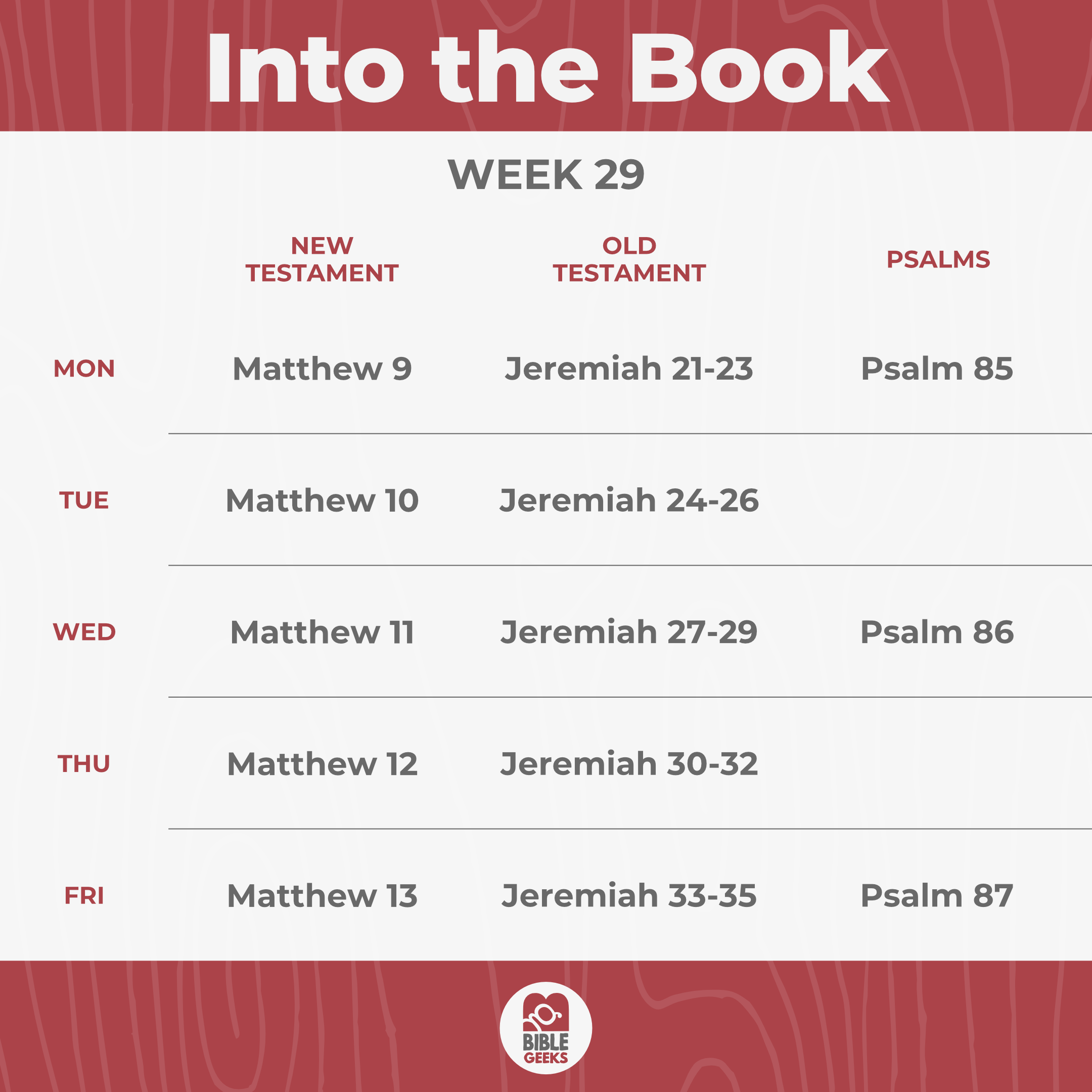
Week 40
A successful recipe requires key ingredients. This week, our New Testament readings show how a healthy faith needs ingredients like reverence and belief. In the Old Testament, we finish Proverbs and then begin Job, getting a peek at a key ingredient to understanding suffering: the hidden spiritual world behind our struggles.

Week 39
How do you prepare for adversity? This week, Peter gives us the mindset, telling us not to be surprised by trials and to cast our anxieties on God. At the same time, the book of Proverbs gives us the toolkit, dispensing timeless, practical wisdom for skillfully navigating the troubles of everyday life.

Week 38
In his final letter, Paul tells Timothy to "share in suffering as a good soldier," while Peter encourages believers with the promise of a living hope. In the Old Testament, we see prophecies of the ultimate suffering servant—the Messiah—in Zechariah, and then begin Proverbs, a book of wisdom for navigating a challenging world.

Week 37
In difficult times, some jobs become essential. In his letters to Timothy, Paul details the "essential" work of elders, deacons, and evangelists in the church. In the Old Testament, prophets like Haggai and Zechariah take on the essential work of encouraging God's people to rebuild the temple, and their hope, after the exile.

Week 36
What makes a great leader? While Paul gives Titus and Timothy a crash course in church leadership, the prophet Micah delivers one of the most famous summaries of leadership for all God's people: "to do justice, and to love kindness, and to walk humbly with your God."

Week 35
After exploring the mind-bending "eternal purpose" of God in Ephesians, the letter pivots to practical application, urging us to "walk in a manner worthy of our calling." The prophet Amos provides a powerful counterpoint, railing against a prosperous kingdom that has failed to walk in justice and righteousness.

Week 34
What has your attention? Paul’s joyful letter to the Philippians encourages us to find peace by focusing on what truly matters. In stark contrast, the prophet Hosea is commanded to marry an unfaithful woman—a dramatic attempt by God to get the attention of His spiritually unfaithful people.

Week 33
It's time to "Think Different." From a prison cell, Paul writes Colossians, challenging us to change our perspective on everything from suffering to relationships. This pairs powerfully with Ezekiel's most famous vision: a valley of dry bones coming to life, a radically different way of thinking about hope and restoration.

Week 32
This week is about seeing the story fulfilled. In Matthew, we reach the stunning climax of the gospel: the trial, the cross, and the glorious resurrection. In Ezekiel, God uses vivid, powerful word-pictures—an unfaithful wife, a sharpened sword—to show the final, fulfilled judgment on a nation consumed by sin.

Week 31
It's time to face the test. In Matthew, Jesus masterfully navigates a series of tests from religious leaders before turning the tables and exposing their hypocrisy with seven blistering "woes." In the Old Testament, we move from the fall of Jerusalem in Jeremiah to the wild, exotic, and faith-testing visions of the prophet Ezekiel in Babylon.

Week 30
Nobody knows the trouble I've seen... but Jesus. This week we see Jesus face immense hardship—grief, betrayal, and being misunderstood—yet His compassion never fails. His experience mirrors that of the prophet Jeremiah, who endures persecution that includes having the king himself burn his scroll of prophecy.

Week 29
The Doctor is speaking. In Matthew, Jesus acts as the Great Physician, speaking words of healing to the sick and teaching in puzzling parables. Meanwhile, the prophet Jeremiah speaks words of both warning and incredible promise to the spiritually sick nation of Judah during the last days before its fall to Babylon.
